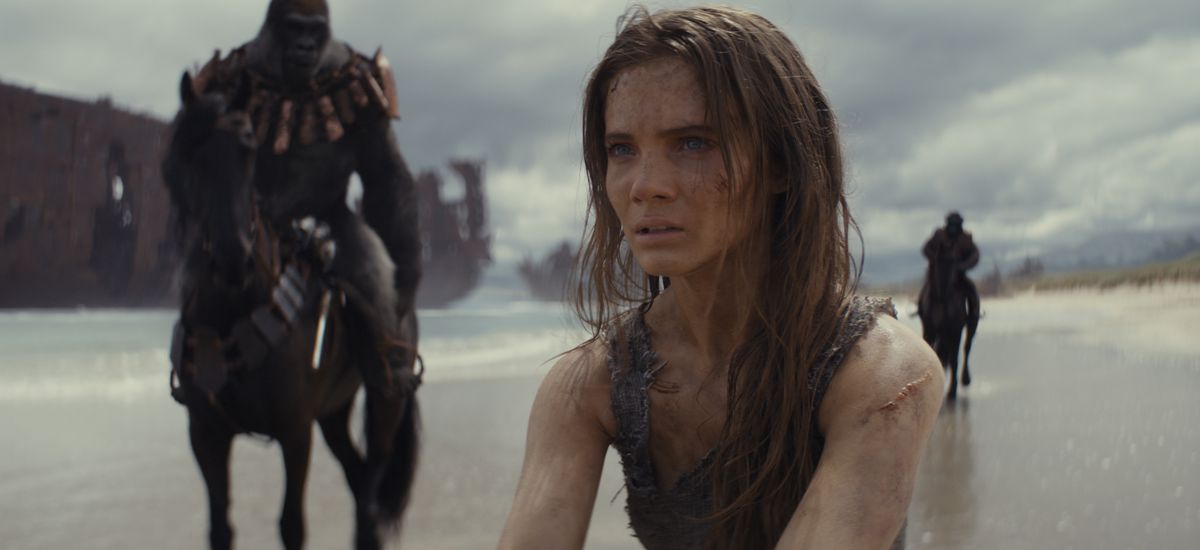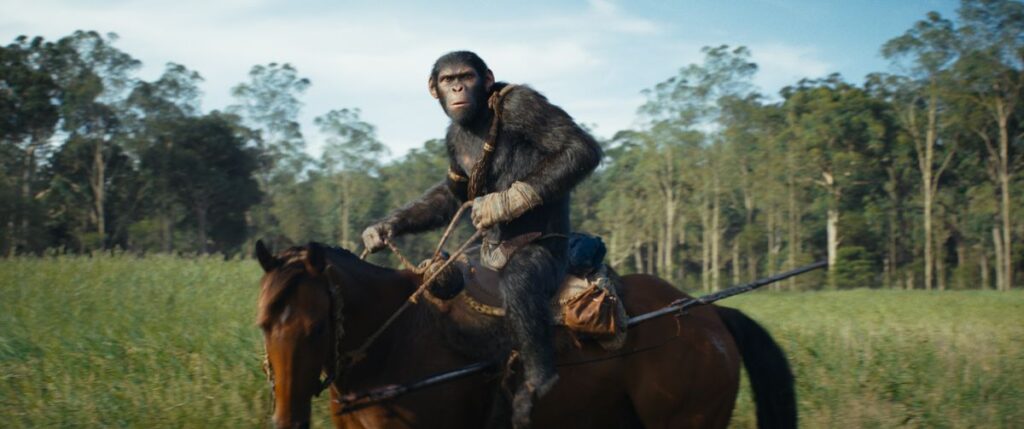Ten years ago, writer Drew McWeeny posed a question in the headline of his latest column: “Has life in the age of casual magic made moviegoers numb to the amazing?” Frustrated by news of what would be 2016’s Alice Through the Looking Glass, which he considered an unnecessary sequel to a film everyone saw and no one really loved, McWeeny revisited the film’s predecessor, Tim Burton’s Alice in Wonderland. He concluded that it was both a terrible movie and a technical marvel. McWeeny’s column articulated an existential crisis in both moviemaking and moviegoing: In a cinematic world without limits, the combination of extraordinary technical innovation and the lack of narrative ambition to match was making moviegoers numb.
Few recent films bring McWeeny’s words to mind more than Kingdom of the Planet of the Apes, Wes Ball’s stand-alone follow-up to the rebooted franchise that began with 2011’s Rise of the Planet of the Apes. Unlike the preceding trilogy, Kingdom is almost entirely an ape story. Noa (Owen Teague), a young chimpanzee from a secluded clan of eagle-raising hunters, seeks to free his people from the clutches of the warlord Proximus (Kevin Durand). Proximus wants to turn a world of disparate ape clans into a kingdom under his rule. The human Mae (The Witcher’s Freya Allan) — who can talk, hundreds of years after a human-made virus robbed most people of their intellects and voices — is caught between them.
As a story, Kingdom of the Planet of the Apes rarely reaches above narrative competence. But because of its almost single-minded focus on the apes, its technical prowess in their rendering is always front and center. It is frankly incredible what the team at Wētā FX has done in conjunction with all of the film’s other effects artists to bring the apes to life, to give them all distinct body language, and to faithfully transpose actors’ every tic and subtle expression onto their faces. These are some of the most soulful digital creations ever seen in a blockbuster action movie, and it’s incredible to see them in a film that is so pedestrian.
Image: 20th Century Studios
There are hints of compelling ideas here. The Apes franchise has long been interested in cycles of oppression, and in anxiety over humanity’s cruelty to its own outgroups, allegorized via the apes. These movies ask: Would victims of humanity’s worst impulses throughout history treat us in kind, were the tables turned?
Kingdom of the Planet of the Apes nods at this thematic heritage with its plot about Mae’s journey, which involves finding a way to restore language and communication to the human race. It raises the question of whether the apes can trust humans with a renewed power to self-actualize. Ball and the screenwriting team (Avatar: The Way of Water trio Josh Friedman, Rick Jaffa, and Amanda Silver) also gesture at contemporary relevance, with the primary antagonist being a demagogue who has twisted the words of the apes’ foundational history and creed to serve his lust for power.
None of it lands, though, because Kingdom of the Planet of the Apes is a story told in only the broadest strokes, with little interest in developing its characters. Noa’s Eagle Clan and Proximus’ burgeoning kingdom are not explored in the least, and very basic questions a viewer might have (like why Mae can talk, for example) are fully ignored. The film is visually uninspired as well, as Ball, along with his longtime cinematographer Gyula Pados, mostly settles for serviceable shots and muted colors — perhaps to not detract from the apes.

Image: 20th Century Studios
A centerpiece of the rebooted Apes trilogy before Kingdom was the participation of Andy Serkis. Serkis, along with the visual effects team on the Lord of the Rings trilogy, is one of the forefathers of modern performance capture, and he remains its staunchest advocate. Including Serkis in a project became an early 21st-century shorthand for taking digitally created characters seriously, and the reputation was earned. As Caesar, leader of the apes, Serkis brought a remarkably human gravitas to the computer-generated chimpanzee for an unforgettable performance, a consistent highlight of the trilogy.
Serkis has a special consultant credit on Kingdom of the Planet of the Apes, but his on-screen presence is sorely missed. He served as an anchor for all that casual magic, challenging the filmmakers (most notably The Batman’s Matt Reeves, once he took over for Dawn of the Planet of the Apes) to match him. By comparison, Kingdom merely seems like an act of franchise maintenance, a reversal for a series of unusually thoughtful blockbusters. Every frame is a technical marvel. And every minute of it is probably better spent watching something else.
Kingdom of the Planet of the Apes premieres in theaters on May 10.

